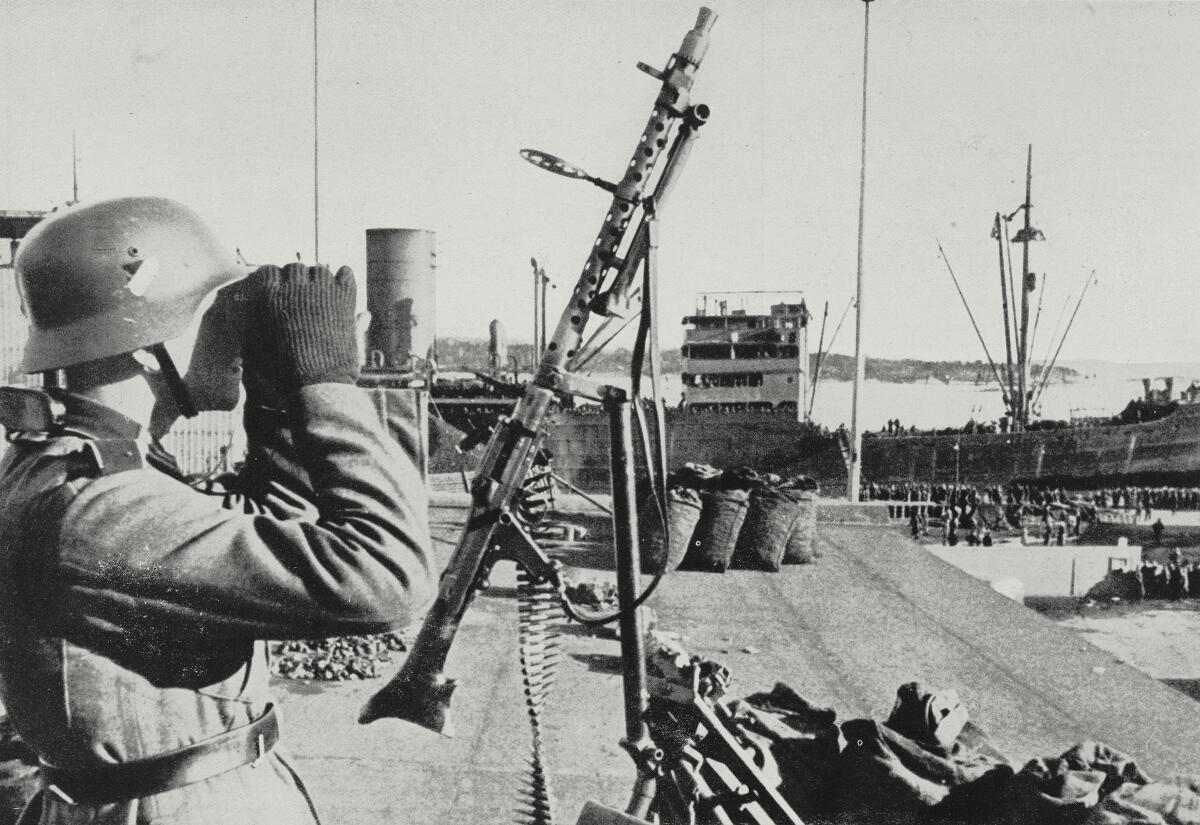Commentary: What 2024 in America has in common with Norway in 1940

- Share via
I was sitting in our apartment in Glendale, but I may as well have been on another planet that day in 1993.
My grandmother, helping me with a sixth-grade report, was vividly recalling the depredations of the Nazi occupation of Norway during World War II: the rationed bread filled with sawdust, the teachers disappeared from their classrooms, the tantrum she threw on a train to thwart her older sister’s arrest by a German officer. Decades after the war, these details came to her with riveting clarity, even though she was barely a teenager when the occupation ended in May 1945.
History shows that fascists get more extreme with time. Anywhere they have come to power, they have done so through an electoral system, with support from a significant segment of voters, in alliance with conventional conservatives.
I recall plenty from that interview with my mor mor (Norwegian for “mother’s mother”), including harrowing tales of resistance. But in 2024, with American democracy frayed and misinformation running rampant, what haunts me more than anything she said is the story of her family’s utter disbelief when the Nazis invaded Norway in April 1940.
Her story makes me wonder how we’ll react if America should tip into authoritarianism. Will we be able to recognize it?
Asking my grandmother about that moment when her country was attacked, I expected to hear tales of parachuting troops and explosions. What she told me instead was a story of confusion, denial — and, yes, hiking.
Donald Trump proved in 2016 that he understood the true nature of the Republican Party better than the party’s leaders. He still does.
The day of the invasion, she said, radio broadcasts reported the Nazi attack. Vidkun Quisling, the leader of a marginal fascist party that had never won a seat in Norway’s parliament, tried to stage a coup over the radio, but few took him seriously. The king and his government fled Oslo, the capital, without surrendering, but their grip on power was tenuous.
All of this unfolded quickly. My grandmother said confusion spread in her family and in her fjord-side community. So, she and her father hiked up a mountain.
Their village, Stamnes, was about a day’s boat ride from Bergen, Norway’s second-largest city. From the clifftops over the fjord, they could glance toward Bergen to see if anything was amiss. The view would be like standing on a hill in La Cañada Flintridge to see Long Beach.
What they saw, my grandmother said, shook them: Planes flew over Bergen, an exceedingly rare sight at the time. The city, a lifeline to rural western Norway, was being attacked.
He’s made it clear time and again that if elected for a second term, he will push the nation into authoritarianism.
Even then, with the truth plainly in the distance for them to see, they couldn’t believe what was happening. Norway had maintained neutrality up to that point, but its people expected Britain to fend off Nazi aggression if it came to that. The recently deceased Norwegian queen was King George VI’s aunt, after all.
Their disbelief did not defeat reality. Norway, a vibrant democracy that granted women suffrage before the U.S. and even elected its king, wouldn’t be rescued from facism until the end of World War II.
Quisling, Norway’s Hitler mini-me (he even called himself the “fører”), would go on to rule an illegitimate puppet government. Though Norway didn’t suffer the same destruction as, say, Poland, the country’s small Jewish population was rounded up for mass murder. Concentration camps opened, and civilians endured fierce Nazi reprisals for acts of resistance.
Of course, our situation in 2024 and the Norwegian situation in 1940 are vastly different — but those differences might not reassure us. We have no external force threatening to topple our democracy. The Norwegians never elected Quisling nor anyone in his party into power.
But what I find in common is the human bias toward normalcy and the refusal to recognize unfolding threats to democracy — in my grandmother’s case, from above a fjord; in ours today, from our screens.
Every time an elected leader bound by the Constitution exalts the Jan. 6 attackers, every time a lawyer argues in court that a president may be able to order a political rival murdered, I find myself on that mountain in western Norway with my mor mor, wondering if what I see is actually happening.
More to Read
A cure for the common opinion
Get thought-provoking perspectives with our weekly newsletter.
You may occasionally receive promotional content from the Los Angeles Times.














